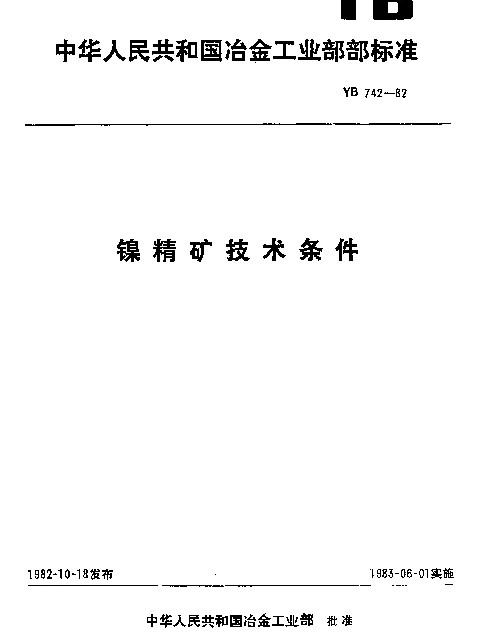-
资源简介
摘要:本文件规定了镍精矿的技术要求、试验方法、检验规则及标志、包装、运输和储存。本文件适用于以硫化镍矿石为原料,经选矿或其他方法制得的镍精矿。
Title:Technical Conditions for Nickel Concentrate
中国标准分类号:H61
国际标准分类号:77.040 -
封面预览

-
拓展解读
YB 742-1982 镍精矿技术条件
Nickel concentrate is a critical raw material in the metallurgical industry, and its quality directly affects the efficiency and output of downstream production processes. The standard YB 742-1982 \"Technical Conditions for Nickel Concentrate\" was established to ensure uniformity and quality control in the production and trading of nickel concentrates. This standard specifies the technical requirements, testing methods, and inspection rules for nickel concentrates, playing a significant role in the global nickel supply chain.
技术要求
According to YB 742-1982, nickel concentrates must meet specific chemical and physical criteria. For instance, the minimum nickel content should not be less than 20%, while impurities such as sulfur and carbon must remain within acceptable limits. These specifications are crucial for ensuring that the final product meets industrial standards. Additionally, the standard outlines the particle size distribution, which impacts the ease of processing and the efficiency of smelting operations.
- Chemical Composition: Nickel content is a primary indicator of the concentrate's value. A higher nickel concentration reduces the cost of subsequent refining processes.
- Impurity Levels: Sulfur and carbon levels are strictly controlled because excessive amounts can lead to operational issues during smelting.
- Particle Size: Proper particle size ensures optimal flowability and mixing during industrial processing.
测试方法与检验规则
The standard also provides detailed guidelines on how to test and inspect nickel concentrates. Testing methods include chemical analysis for determining metal content and particle size analysis using sieves. Inspection rules ensure that every batch of concentrate adheres to the specified standards before it enters the market or is used in industrial applications. Regular audits and compliance checks are essential to maintain the integrity of the standard.
- Chemical Analysis: Techniques such as atomic absorption spectroscopy are employed to measure the precise nickel content.
- Particle Size Analysis: Sieve tests help determine whether the concentrate particles are within the required range.
- Inspection Frequency: Companies are encouraged to conduct inspections at regular intervals to ensure ongoing compliance with YB 742-1982.
实际应用与影响
YB 742-1982 has had a profound impact on the nickel industry, particularly in countries where nickel mining is prevalent. For example, in Indonesia, one of the world's largest nickel producers, adherence to this standard has led to improved product quality and increased buyer confidence. In 2020, Indonesian nickel concentrate exports reached $10 billion, reflecting the growing demand for high-quality nickel products.
Moreover, the implementation of YB 742-1982 has facilitated smoother trade negotiations between suppliers and buyers. By providing clear benchmarks, the standard reduces disputes over product quality and enhances transparency in transactions. This has been particularly beneficial in regions like Southeast Asia, where nickel mining activities have surged in recent years.
In conclusion, YB 742-1982 serves as a cornerstone for the nickel concentrate industry, ensuring consistent quality and reliability. Its influence extends beyond mere technical specifications, impacting global trade dynamics and contributing to the sustainable growth of the nickel sector.
-
下载说明
预览图若存在模糊、缺失、乱码、空白等现象,仅为图片呈现问题,不影响文档的下载及阅读体验。
当文档总页数显著少于常规篇幅时,建议审慎下载。
资源简介仅为单方陈述,其信息维度可能存在局限,供参考时需结合实际情况综合研判。
如遇下载中断、文件损坏或链接失效,可提交错误报告,客服将予以及时处理。